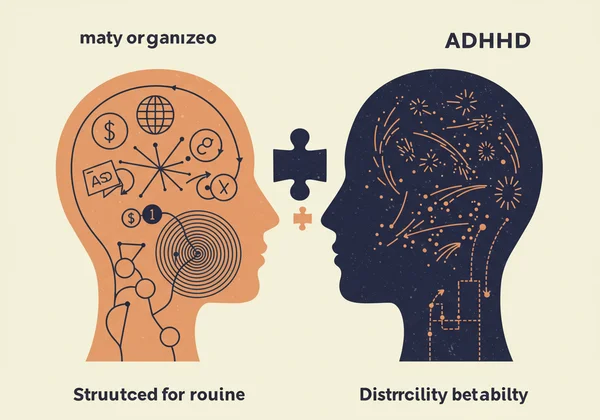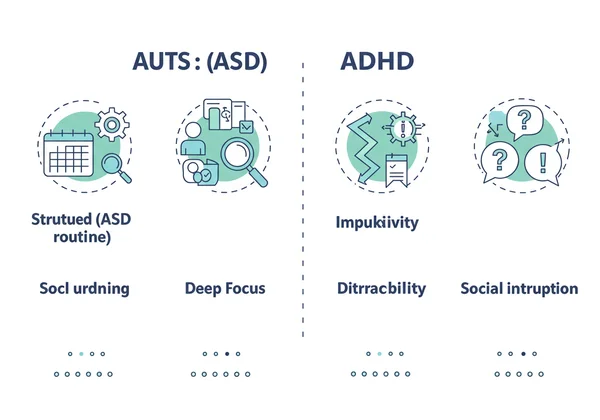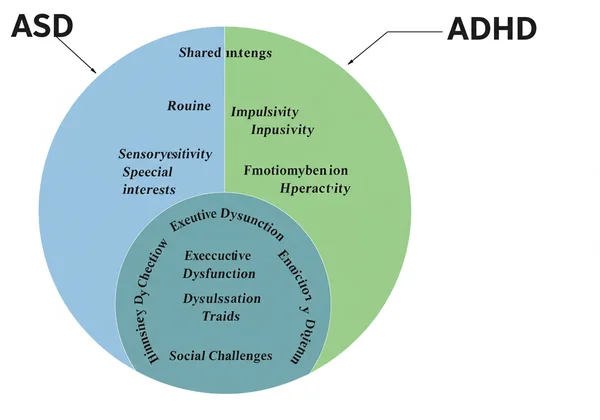ASD vs. ADHD: Could an Online ASD Test Provide Clarity?
August 17, 2025 | By Eleanor Sutton
Navigating the world of neurodiversity can feel like trying to solve a complex puzzle, especially when it comes to understanding the characteristics of Autism Spectrum Disorder (ASD) and Attention-Deficit/Hyperactivity Disorder (ADHD). As a parent, you might notice your child struggling with focus and social cues. As an adult, you might have always felt slightly out of sync with your peers. This often leads to the core question of asd vs adhd: how can you tell the difference?
This guide is here to help. We'll walk through the key distinctions, the surprising similarities, and the significant overlap between these two neurodevelopmental conditions. Our goal is to provide clarity and empower you with knowledge. While this article is a source of information, a preliminary screening can be a helpful first step to gain personal insight.

What is the Difference Between Autism and ADHD?
While both ASD and ADHD can affect communication, behavior, and learning, their underlying causes are different. Think of it this way: two people can both be late for a meeting, but one might be late because they couldn't find their keys (an ADHD-like challenge with organization), while the other might be late because the usual bus route was changed, causing significant distress (an ASD-like challenge with routine). Let’s break down the core differences.
Social Interaction: Aversion vs. Inattention
A common point of confusion is social challenges. Both autistic individuals and those with ADHD can struggle in social settings, but the "why" is often different.
For an autistic person, the difficulty often stems from a challenge in intuitively understanding and applying unwritten social rules. They may not naturally pick up on body language, sarcasm, or tone of voice, which can make conversations feel like they are conducted in a foreign language. They might avoid social situations because they are genuinely confusing and overwhelming.
For a person with ADHD, social difficulties are frequently a result of inattention, impulsivity, or hyperactivity. They might unintentionally interrupt others, miss parts of a conversation because their mind has drifted, or seem overly talkative. Their desire for social connection is usually strong, but their executive function challenges get in the way of smooth interaction.
Focus: Intense Interests vs. Distractibility
The way focus works is another major differentiator. Autistic individuals often have what are known as "special interests" or deep, passionate interests in specific subjects. They can focus intensely on these topics for hours, acquiring a vast amount of knowledge. This is a powerful, sustained form of concentration.
Conversely, ADHD is primarily characterized by distractibility and a challenge in regulating attention. While people with ADHD can also experience "hyperfocus," it's often on novel and highly stimulating activities and may not be as easily controlled. More commonly, their attention is pulled in many different directions, making it hard to complete tasks that are perceived as mundane or uninteresting. Taking an adult asd test can sometimes help clarify whether your focus patterns align more with one profile than the other.
Behavior: Routine-Driven vs. Impulsive Actions
Behavioral patterns offer significant clues. A hallmark of ASD is a strong preference for routine and predictability. Sameness is comforting and helps reduce anxiety in a world that can feel chaotic and unpredictable. Unexpected changes can be deeply distressing. This is often accompanied by repetitive behaviors or movements, known as "stimming," which help regulate sensory input and emotions.
Individuals with ADHD, on the other hand, are often driven by impulsivity and a search for novelty. They may act without thinking through the consequences, struggle with waiting their turn, and constantly seek new and exciting experiences to stimulate their brains. While they can also stim, it's often related to excess energy or a need to improve focus. If you're observing these traits in your child, an asd test for child might provide a useful preliminary framework.

Emotional Regulation and Sensory Processing
Both autistic individuals and those with ADHD can experience intense emotions and sensory sensitivities. However, the triggers can differ. An autistic person may have a meltdown due to sensory overload—lights that are too bright, sounds that are too loud, or the texture of their clothing. This is a response to the brain being completely overwhelmed by sensory information.
For someone with ADHD, emotional dysregulation is often linked to frustration, impatience, or a heightened sensitivity to perceived rejection (a concept known as Rejection Sensitive Dysphoria). While they can also have sensory sensitivities, the meltdowns are more frequently tied to executive function challenges and emotional control.
Understanding the ADHD Autism Overlap
To add another layer of complexity, it's not always a case of "one or the other." The overlap between autism and adhd is significant, and it is possible to have both.
Can You Have Both ASD and ADHD?
Yes, absolutely. The co-occurrence of ASD and ADHD is quite common. For many years, psychiatric guidelines (specifically, the DSM-IV) did not allow for a dual diagnosis. However, this changed in 2013 with the release of the DSM-5, which acknowledged that a person can indeed have both conditions. Research now suggests that a large percentage of autistic individuals also have traits that meet the criteria for ADHD, and vice-versa.
How Co-occurrence Impacts Daily Life
Having both ASD and ADHD presents a unique set of challenges. Imagine your brain craving the structure and routine associated with autism, while another part of your brain craves the novelty and stimulation associated with ADHD. This can create a constant internal push-and-pull. For example, you might meticulously plan your day (ASD trait) but be unable to initiate the first task due to executive dysfunction (ADHD trait). This can be incredibly frustrating and exhausting, making it even more important to explore your traits for a clearer picture.

Why a Comprehensive Evaluation is Crucial
Because these conditions can mask or amplify each other, untangling them requires a professional. An online screening can be a fantastic starting point, providing valuable data and organizing your observations. However, for a formal diagnosis, you must consult a qualified healthcare professional, such as a psychologist or psychiatrist, who can conduct a comprehensive evaluation. This evaluation will look at your developmental history, behaviors, and experiences to provide an accurate picture.
Your Path to Clarity Starts with Understanding
Whether the traits you see in yourself or your loved one point toward ASD, ADHD, or a combination of both, remember that these are simply labels for different ways of processing the world. They are not character flaws. Understanding these differences is the first and most powerful step toward finding the right strategies, accommodations, and support.
If you recognize certain characteristics discussed here and want to explore them further in a structured way, a preliminary screening can be an insightful first step. It can help you gather your thoughts before seeking professional advice.
Ready to begin your journey of self-discovery? Take our free online ASD test to gain a better understanding of your unique profile.
Frequently Asked Questions About ASD & ADHD
What is the difference between an ASD test and a diagnosis?
This is a crucial distinction. An online asd test, like the one offered on our site, is a screening tool. It's designed to identify potential traits and indicate whether a formal evaluation might be beneficial. A diagnosis, however, can only be given by a qualified healthcare professional after a comprehensive assessment. Think of our test as the first step, providing initial insights, not a final conclusion.

Am I autistic or just socially awkward?
Many people feel socially awkward at times. The key difference often lies in the frequency, intensity, and underlying reason. Is the awkwardness due to a fundamental difficulty in understanding social cues (more aligned with ASD), or is it more about anxiety and fear of judgment? If you consistently feel like you're "missing the script" in social situations, an asd self test can be a private, low-pressure way to explore whether your experiences align with common autistic traits.
What are the first signs of autism to look for?
First signs vary by age. In toddlers, it might be delayed speech, not responding to their name, avoiding eye contact, or having very intense interests. In adults, it can be more subtle, often masked by learned coping strategies. What are the signs of autism in adults? They often include a lifelong feeling of being "different," intense exhaustion after socializing, a deep need for routine, and sensory sensitivities. An online asd screening can help identify these potential signs in a structured format.